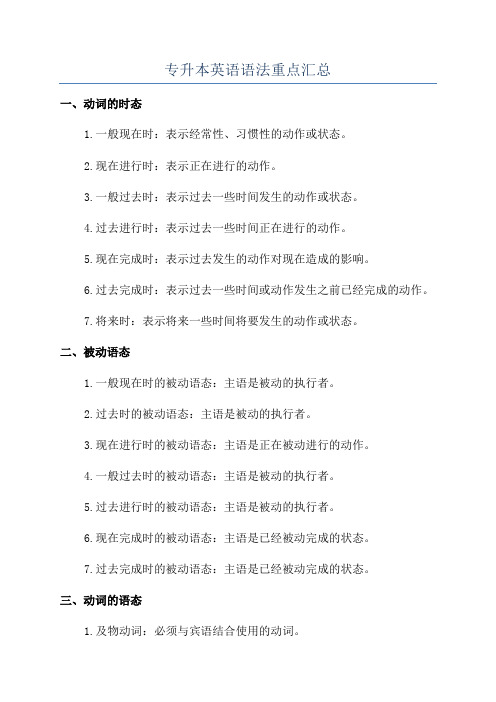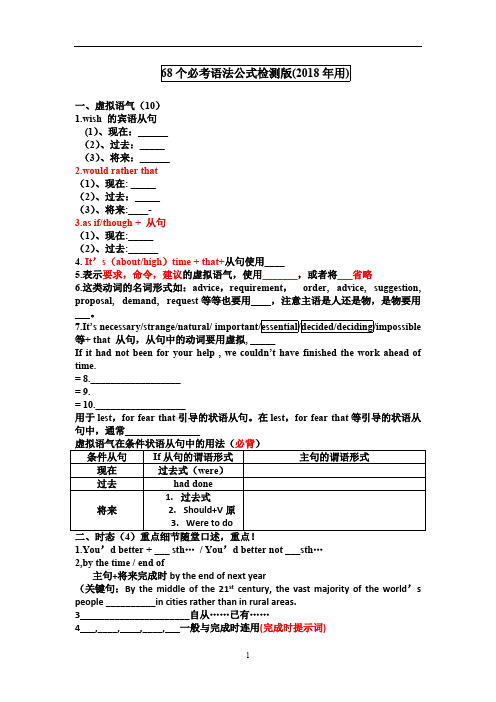专转本英语语法总复习
专业英语专升本知识点总结

专业英语专升本知识点总结1. English grammarGrammar is one of the most important aspects of learning English. It is the foundation of the language and without a good understanding of grammar, it is difficult to build a coherent and understandable sentence. Some key grammar points include verb tenses, prepositions, pronouns, articles, and the order of adjectives. Understanding these grammar rules and how to use them correctly is essential for effective communication in English.2. VocabularyVocabulary is another crucial aspect of learning English. Without a good grasp of vocabulary, it is impossible to express yourself effectively. You need to be able to understand, recognize, and use a wide range of words and phrases in order to communicate fluently. This includes both general vocabulary and specialized vocabulary related to specific fields such as business, finance, technology, and medicine.3. Reading comprehensionBeing able to understand written English is an essential skill for adult learners. This includes understanding the main idea, identifying supporting details, and understanding the writer's purpose and tone. Being able to comprehend written material is critical for academic success and is also important for everyday life, as it allows you to read and understand important information such as news articles, emails, and technical documents.4. Writing skillsBeing able to write effectively is another important skill for adult learners. This includes writing clear and coherent essays, reports, emails, and other types of documents. To do this, you need to be able to organize your thoughts, use correct grammar and vocabulary, and structure your writing in a logical and coherent manner. Writing is a key skill for academic success, as well as for many professional and personal situations.5. Speaking and listeningBeing able to speak and understand spoken English is crucial for effective communication. This includes being able to hold a conversation, ask and answer questions, and express your thoughts and opinions. Listening skills are also important, as they allow you to understand what others are saying and respond appropriately. Being able to speak and listen effectively is essential for social, professional, and academic situations.6. PronunciationGood pronunciation is critical for effective communication in English. If your pronunciation is poor, it can be difficult for others to understand you. This includes being able to produce the correct sounds, stress, and intonation patterns, as well as understanding how differentwords are pronounced in different contexts. Improving your pronunciation is essential for effective communication in English.7. Cultural knowledgeUnderstanding the cultural aspects of English-speaking countries is important for effective communication. This includes understanding social customs, business practices, and everyday life. It also includes being aware of different accents, dialects, and regional variations in English, as well as understanding the cultural context of different expressions and idioms. Understanding the cultural aspects of English is important for social and professional interactions.8. Test preparationFinally, many adult learners are preparing for English proficiency tests such as the TOEFL, IELTS, or Cambridge exams. These tests measure a person's ability to read, write, speak, and understand English, and are often used for academic or professional purposes. Test preparation involves understanding the format of the test, practicing test-taking strategies, and improving your skills in reading, writing, speaking, and listening.In conclusion, adult learners of English need to focus on a range of key skills and knowledge points in order to communicate effectively in English. This includes grammar, vocabulary, reading comprehension, writing skills, speaking and listening, pronunciation, cultural knowledge, and test preparation. By mastering these skills and knowledge points, adult learners can improve their ability to communicate in English, both in everyday life and in academic and professional contexts.。
专升本英语语法重点汇总

专升本英语语法重点汇总一、动词的时态1.一般现在时:表示经常性、习惯性的动作或状态。
2.现在进行时:表示正在进行的动作。
3.一般过去时:表示过去一些时间发生的动作或状态。
4.过去进行时:表示过去一些时间正在进行的动作。
5.现在完成时:表示过去发生的动作对现在造成的影响。
6.过去完成时:表示过去一些时间或动作发生之前已经完成的动作。
7.将来时:表示将来一些时间将要发生的动作或状态。
二、被动语态1.一般现在时的被动语态:主语是被动的执行者。
2.过去时的被动语态:主语是被动的执行者。
3.现在进行时的被动语态:主语是正在被动进行的动作。
4.一般过去时的被动语态:主语是被动的执行者。
5.过去进行时的被动语态:主语是被动的执行者。
6.现在完成时的被动语态:主语是已经被动完成的状态。
7.过去完成时的被动语态:主语是已经被动完成的状态。
三、动词的语态1.及物动词:必须与宾语结合使用的动词。
2.不及物动词:不需要与宾语结合使用的动词。
四、倒装句1.完全倒装:把助动词或情态动词放在主语前。
2.部分倒装:把助动词或情态动词放在谓语动词前。
五、情态动词1. can:表示能力、许可、可能。
2. could:表示过去的能力、许可、可能。
3. may:表示允许、可能。
4. might:表示过去可能。
5. must:表示推测、必须。
6. shall:表示将来的意愿。
7. should:表示建议、应该。
8. will:表示将来。
9. would:表示过去习惯、愿意。
六、名词1.可数名词:可以用来计数的名词。
2.不可数名词:不可以用来计数的名词。
3.特殊名词变复数形式。
4.特殊名词变单数形式。
七、形容词和副词1.形容词在句中的位置。
2.形容词比较级和最高级。
3.副词在句中的位置。
4.副词比较级和最高级。
五、代词1.主格代词:作为主语的代词。
2.宾格代词:作为宾语的代词。
3.物主代词:表示所属关系的代词。
4.反身代词:表示动作反过来作用于自己的代词。
专转本英语语法总结

专转本英语语法总结摘要:1.引言2.英语语法概述a.名词b.动词c.形容词和副词d.代词e.介词f.连词g.句子结构3.常见错误及解析a.名词单复数错误b.动词时态和语态错误c.形容词和副词用法错误d.代词替换错误e.介词使用不当f.连词搭配错误4.专转本英语语法技巧a.名词识别法b.动词时态记忆法c.形容词和副词排序法d.代词替换训练法e.介词搭配规律f.连词用法口诀5.结论正文:一、引言随着我国教育制度的不断发展,专转本考试成为了许多大专生追求更高学历的途径。
英语作为必考科目之一,语法知识掌握的熟练程度直接影响到考试成绩。
本文将对专转本英语语法进行总结,帮助同学们系统地学习和掌握英语语法知识。
二、英语语法概述1.名词:名词是表示人、物、地点、事物等概念的词。
名词有单数和复数两种形式,如:boy(单数),boys(复数)。
2.动词:动词表示动作或状态,如:run(跑)、write(写)。
动词有原形、过去式、过去分词等形式。
3.形容词和副词:形容词用于修饰名词,表示性质、特征等,如:big (大);副词用于修饰动词、形容词等,表示程度、地点、时间等,如:very (非常)、now(现在)。
4.代词:代词用于替换名词,避免重复,如:he(他)、she(她)、they (他们)。
5.介词:介词用于表示名词、代词与其他词之间的关系,如:in(在)、on(在……上面)。
6.连词:连词用于连接词、词组或句子,如:and(和)、but(但)。
7.句子结构:句子由主语、谓语、宾语等成分组成,如:I love you(我爱你)。
三、常见错误及解析1.名词单复数错误:如将boy写成boys,girl写成girls。
2.动词时态和语态错误:如将run写成running,write写成written。
3.形容词和副词用法错误:如将big写成very big,now写成nowadays。
4.代词替换错误:如将he替换成she,they替换成they。
专升本英语语法与词汇知识点总结

专升本英语语法与词汇知识点总结在专升本的英语考试中,语法和词汇是两个至关重要的部分。
掌握好这两方面的知识,对于提升英语成绩和语言运用能力有着举足轻重的作用。
下面,我将为大家详细总结专升本英语中常见的语法和词汇知识点。
一、语法知识点(一)动词时态1、一般现在时表示经常发生的动作、存在的状态或客观真理。
其构成是主语+动词原形(当主语是第三人称单数时,动词要加“s”或“es”)。
例如:“He often goes to school by bike”2、一般过去时表示过去发生的动作或存在的状态。
构成是主语+动词的过去式。
如:“I played basketball yesterday”3、现在进行时表示正在进行的动作。
其结构是“主语+ be 动词+动词的现在分词”。
比如:“They are watching TV now”4、过去进行时强调过去某个时间正在进行的动作,形式为“主语+ was/were +动词的现在分词”。
像:“I was reading a book at that time”5、现在完成时表示过去发生的动作对现在造成的影响或结果,或者从过去开始一直持续到现在的动作。
其构成是“主语+ have/has +过去分词”。
例如:“She has learned English for five years”6、过去完成时表示过去某个时间之前已经完成的动作,结构是“主语+ had +过去分词”。
比如:“By the end of last year, we had learned 2000 words”(二)语态1、主动语态主语是动作的执行者。
例如:“He opened the door”2、被动语态主语是动作的承受者,构成是“be +过去分词”。
如:“The door was opened by him”(三)非谓语动词1、动词不定式具有名词、形容词和副词的特征,可作主语、宾语、定语、状语等。
英语专升本语法知识点汇总

英语专升本语法知识点汇总一、时态。
1. 一般现在时。
- 用法:- 表示经常或习惯性的动作或存在的状态。
例如:I go to school by bike every day.(我每天骑自行车去上学。
)- 表示客观事实或普遍真理。
例如:The earth moves around the sun.(地球绕着太阳转。
)- 结构:- 主语为第三人称单数(he/she/it等)时,动词要加 -s或 -es,如He likes reading. 其他人称用动词原形,如I like reading.2. 一般过去时。
- 用法:- 表示过去某个时间发生的动作或存在的状态。
例如:I visited my grandparents last weekend.(我上周末去看望了我的祖父母。
)- 结构:- 动词一般用过去式形式。
规则动词的过去式一般在词尾加 -ed,如work - worked;不规则动词有其特殊的过去式形式,如go - went。
3. 一般将来时。
- 用法:- 表示将来某个时间要发生的动作或存在的状态。
例如:I will go to Beijing next month.(我下个月将去北京。
)- 结构:- 常见的结构有will+动词原形,be going to+动词原形(表示计划、打算做某事或有迹象表明即将发生某事)。
如He is going to have a party tonight.(他今晚打算举办一个聚会。
)4. 现在进行时。
- 用法:- 表示现在正在进行的动作或存在的状态。
例如:She is reading a book now.(她现在正在读一本书。
)- 结构:- be动词(am/is/are)+动词的 -ing形式。
5. 过去进行时。
- 用法:- 表示过去某个时刻或某段时间正在进行的动作。
例如:I was watching TV at 8 o'clock last night.(昨晚8点我正在看电视。
专转本英语语法高效复习

以 “S” 结尾 的表 示学 科或 专业 的名 词
Mathematics__ easy to learn. (is) 数学很容易学。 解析 有些学科或专业的名词虽以“s” 结尾,但概念上仍为单数。常 用的这类词 athletics(体育) classics (古典文学)economics (经济学) ethics(伦理学) linguistics (语言学) mathematics(数学) physics (物理学) politics(政治学)
以“S”结尾的单复数同行名 词
• 1、Every means __ been tried since then. (has) • 自从那时起,每一种方法都试用过了。 • 2、A whole series of mistakes __ to the present dilemma. (has led) • 一连串的错误导致现在的困境。
二、
有些集合名词可用作单数,也可用作复数,当表 示整体概念时作单数用。如:The team is the best in the league(这支队伍是联赛中最棒的.)但 当表示这个整体中所有的成员时,这些词就作复 数用。 如:The team are during to zhe game in their own cars.(队员们是开自己的车去参加比赛的) 常见的这类名词有:class(班级) Committee(委员会),couple(夫妻), crew(全体船员),faculty(全体教员), family(家庭),jury(陪审团),team(队)等。
解析
对这一类词考查的重点是在其作主语的时候
分辨其和谓语动词的一致关系。判断的时候 首先要分清它是单数还是复数,然后确定谓 语动词是单数还是复数。这一类词: crossroads (十字路口)headquarters(总部) means (手段)series(系列) species (物种) works(工厂)
专升本英语语法重点汇总

专升本英语语法重点汇总1.主谓一致- 单数主语与单数谓语动词搭配,如"The cat is sleeping."- 复数主语与复数谓语动词搭配,如"The cats are sleeping."- 不定代词"everyone, everybody, someone, somebody"的主语与谓语动词搭配时,使用第三人称单数形式,如"Everybody loves ice cream."2.时态- 现在进行时:表示目前正在发生的动作或临时的动作,一般由“be + 现在分词”构成,如"She is reading a book."- 现在完成时:表示过去发生的一种持续的动作或状态,与现在的影响或结果有关,一般由“have/has + 过去分词”构成,如"They have finished their homework."- 过去进行时:表示过去其中一具体时间正在进行的动作,一般由“was/were + 现在分词”构成,如"We were playing basketball yesterday."- 过去完成时:表示在过去其中一时间或动作之前已经完成的动作,一般由“had + 过去分词”构成,如"She had already eaten when I arrived."3.强调句- 强调句是为了将强调句子中的一些成分突出表达,一般由“Itis/was + 被强调部分 + that/who + 原句其余部分”构成,如"It was John who told me the good news."- 当强调句的被强调部分是动词时,需使用“do/does/did”来构成强调句,如"It was he who did all the work."4.虚拟语气- 与现在事实相反的虚拟语气,使用"would, could, might"等情态动词与原型动词搭配,如"If I were you, I would go to the party."- 与过去事实相反的虚拟语气,使用"had + 过去分词"构成,如"IfI had known, I would have helped him."5.定语从句- 定语从句用来修饰先行词,修饰的内容可以是人、事物或整个句子,一般由关系代词"who, whom, whose, which, that"或关系副词"where, when, why"引导,如"The book that I bought is very interesting."6.名词性从句- 主语从句:作为句子的主语,一般由"that, whether, who, whom, which"引导- 宾语从句:作为句子的宾语,一般由"that, whether, if, what, who, whom, which"引导,如"I don't know what to do."- 表语从句:位于系动词之后,与主语构成等价关系,一般由"that, whether, who, whom, which"引导,如"The important thing is that you try your best."7.比较级和最高级- 比较级用来比较两个人或物之间的差异,一般在形容词或副词前加"more"或"less"构成,如"She is taller than her sister."- 最高级用来表示三个或三个以上人或物之间的差异,一般在形容词或副词前加"the most"或"the least"构成,如"He is the tallest boy in the class."以上是专升本英语语法的重点汇总,希望对你的学习有所帮助。
专转本英语68个语法考点

68个必考语法公式检测版(2018年用)一、虚拟语气(10)1.wish 的宾语从句(1)、现在:______(2)、过去:_____(3)、将来:______2.would rather that(1)、现在: _____(2)、过去:_____(3)、将来:____-3.as if/though + 从句(1)、现在:_____(2)、过去:______4. It’s(about/high)time + that+从句使用____5.表示要求,命令,建议的虚拟语气,使用_______,或者将___省略6.这类动词的名词形式如:advice,requirement,order, advice, suggestion, proposal, demand, request等等也要用____,注意主语是人还是物,是物要用___。
7.It’s necessary/strange/natural/ important/essential/decided/deciding/impossible 等+ that 从句,从句中的动词要用虚拟, _____If it had not been for your help , we couldn’t have finished the work ahead of time.= 8.__________________= 9.= 10.__________________用于lest,for fear that引导的状语从句。
在lest,for fear that等引导的状语从句中,通常_______________虚拟语气在条件状语从句中的用法(必背)条件从句If从句的谓语形式主句的谓语形式现在过去式(were)过去had done将来1.过去式2.Should+V原3.Were to do二、时态(4)重点细节随堂口述,重点!1.You’d better + ___ sth…/ You’d better not ___sth…2,by the time / end of主句+将来完成时by the end of next year(关键句:By the middle of the 21st century, the vast majority of the world’s people __________in cities rather than in rural areas.3______________________自从……已有……4___,____,____,____,___一般与完成时连用(完成时提示词)______________________________________________四种时态三、固定句式(12)1、I have no doubt + _____2、I have trouble/difficulty +__________3、It is/was…. +______(强调句)4、The more…, ________ The more…, ________5、Make +___________________________6、It is difficult ( adj. ) +_____________It is + adj. +____________________.7、It is likely +________________________It is unlikely +______________________It is likely +_________________It is unlikely +_____________________8、It/there is no use/no good/no point + _____________9、Only +_____________________________10、直到…才_________________________________11、_________________________________没过多长时间就…__________________________________过了多长时间才…12. It takes sb some time _______sth; sb spend some time (in)doing sth四、倍数/从句(6)_____________1、主语+谓语+倍数(或分数)+ as + adj. + asEg: I have three times _________ you.我有你三倍那么多。
- 1、下载文档前请自行甄别文档内容的完整性,平台不提供额外的编辑、内容补充、找答案等附加服务。
- 2、"仅部分预览"的文档,不可在线预览部分如存在完整性等问题,可反馈申请退款(可完整预览的文档不适用该条件!)。
- 3、如文档侵犯您的权益,请联系客服反馈,我们会尽快为您处理(人工客服工作时间:9:00-18:30)。
现在完成时 have been 和have gone 的区别:
have / has been 用来表示以往的经历,译为“来(到) 过”,常与频度状语once, ever等连用。如:
Have you ever been there?
你曾去过那里吗?(不能用has come)
They have been to Beijing twice. 他们去过北京两次。(不能用have gone) have / has gone表示“走了”、“到…去了” 如: He has gone to Shanghai. 他到上海去了。
• ②表示推测,相当于"must have done"结构。 You will have heard of this, I guess. 我想你已经听说过这件事了。 I am sure he will have got the information. 我相信他一定得到了这个信息
• ③.表示某种状态一直持续到说话人 所提及的时间 • we will have been married a year on June 25th . • 到6月25日我们俩结婚就满1年了
4.be to + 动词原形和be about to + 动词原 形也表示将来。前者指“安排好的事”,后 者指“即将发生的事”。如:
The children are to learn English next week.
现在进行时: ①表示目前这段时间内正在进行的动作 (尽管此时此刻该动作并不进行)。如: --- What is he doing this week? --- He is translating a novel.
• ③被first, last, only, few, much, some, any, no 及形容词最高级等修饰。 • She is the prettiest girl that I’ve ever seen. • ④先行词是表示人和物的两个并列名词词 组: • We were deeply impressed by the teachers and schools that we had visited there.
• but= that not There is no one but knows it. 此事无人不知. There has not been a scholar but was a man of industry. 凡是有学问的人都是勤奋的 There is no man but errs. 凡是人都会犯错误. There no man but thanked him.
3、疑问词+ever与 no matter+疑问词的区别 是:
疑问词+ever 比 单独用疑问词引导从句语气要强. 如:Whoever leaves the room last ought to turn off the lights.
• 定语从句中 as 引导的定语从句 当先行词前出现 such , as ,the same时。 You are just the same as you were when I first met you. 非限制性定语从句: As is reported; As you can see; As you know,
• 从句
名词性从句的注意事况
• 1、what与that 的区别:
that 连词在从句中不作成分,不含有疑 问意义,只起语法连接作用; 而 what 连 词在从句中作成分,且含有疑问意义.(作 主语,宾语或表语)
That he stole a bike was true. 他偷了一部自行车是真的
The important thing is what you do , but not what you say . 重要的是你做什么,而不是说什么。
(他可能在途中,也可能已到上海,但不在这里。)
过去完成时:
可以表示过去未曾实现的希望、打算或意图,常 与hope, intend, mean, expect, think, want, suppose 等动词连用。如:
I had hoped to be able to take my seat in all this noise without being seen, but that morning the room was quiet and orderly. 原希望在那一阵阵喧闹声中 趁人不注意偷偷溜到自己的座位上,可是那天早 上,教室里却是那么安静而又有序。
• B) • 先行词是如下情况时,关系代词应该用that,不 用which。 • ①不定代词:all, much, everything, something, nothing等。 • All that I said was for your good. • I never take anything that doesn’t belong to me. • ②序数词: • This is the first time that I’ve been in China.
l 注:在含有由after, before等引导 的状语从句的复合句中,由于这类词本 身的意义能够明确表示时间的先后关系, 因此谓语动词常用一般过去时代替完成 时。如: After he finished his homework, he went to bed.
将来完成时:
由shall / will have + 动词的过去分词构 成 疑问式:将shall / will移至主语之前
2.若表示已安排或计划好的将来动作或存 在状态,可用一般现在时代替一般将来 时,其谓语动词常为be, come, go, arrive, leave, start等。
3. 表示按计划即将发生的动作,可用现在 进行时代替将来时。此用法多与表示位移的 动词come, go, arrive, leave, fly, start等连用。 如: He is leaving for London.
• for因为,由于;表明附加或推断的理 由,引导的分句前常有逗号,for分句 不放句首: He must be ill, for he is absent today. 他一定病了,因为他今天缺席了。 • since既然,因为。侧重主句,从句表 示显然的或已知的理由。 Since you ask, I will tell you. 你既然 问,我就告诉你。
• 语态
1 有些动词,如 need, require, want, worth, deserve等,后面接动名词的主动式表示被动 的含义。 e.g. The radio needs repairing. The book is worth reading. The house is to let.(出租) You are to blame.(该受责备)
② 现在进行时常与副词always, constantly 连用,表示反复出现或习惯性动作,含有 说话者的赞扬、不满、讨厌、遗憾等情绪。 如: You’re always making the same mistake. She’s constantly changing her mind. ③ 用进行时可以表示过程。如: It’s getting cold. The leaves on the trees are turning brown.
否定式:shall / will not (shan’t / won’t) have + 动词的过去分词 代表性的时间状语:
by the end of +将来时间的词 by+ 将来时间的词
用法:
• ①表示在将来某一时间之前已完成的动 作。 • We shall have learned 12 units by the end of this term. • 到这个学期末,我们将学完12个单元。
2、一些不及物动词/短语没有被动语态,如rise, happen, succeed, remain, lie; take place, break out, belong to, lose heart, consist of, add up to等。 e.g. His job consists of helping old people who live alone. When we got to the top of the mountain, the sun had already risen.
结果状语从句 • 由so…that, such…that等引导。 • (1)“so+adj./adv.+that”, • “so+adj.(+a/an)+ n.+that”; (2)“such(+a/an)(+adj.)+n.+that”。
• 1.so只能修饰单数可数名词,这个时候可 以与such 互换。 • so clever a boy = such a clever boy • 2.如果修饰可数名词的复数,或不可数名 词,就要用such. • such clever boys (不能说so clever boys) such nice weather!(不能说so nice weather) • 3. 但如果碰到many, much, few, little这四 个词,就必须用so. so many students so much money so few students so little money
状语从句: 由as soon as引导时,表示主句动作发生在从 句动作的一瞬间之后(注意:the moment, the instant,the second,the minute都可做 连词用,意思是as soon as。) • The moment I saw him, I knew that he was angry with me. 我一见到他,就知道他在生我的气。
• 特殊的让步状语从句 • Adj.+as +sb/sth+is/was, 也可以用来表示 让步。 Young as she is, she performs very well in the competition.
